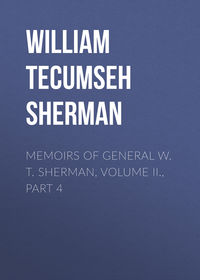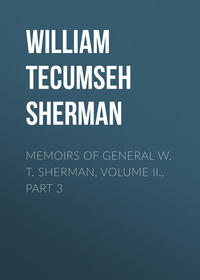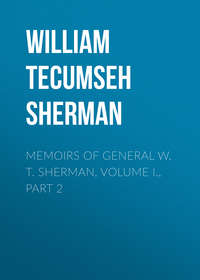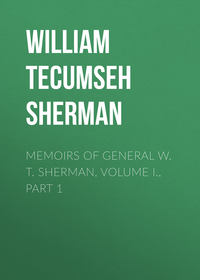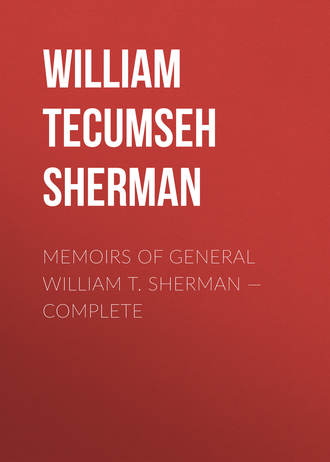 полная версия
полная версияMemoirs of General William T. Sherman — Complete
HEADQUARTERS DEPARTMENT OP THE CUMBERLAND, LOUISVILLE, KENTUCKY,
October 22, 1881.
To General L. THOMAS, Adjutant-General, Washington, D. C.
Sir: On my arrival at Camp Dick Robinson, I found General Thomas had stationed a Kentucky regiment at Rock Castle Hill, beyond a river of the same name, and had sent an Ohio and an Indiana regiment forward in support. He was embarrassed for transportation, and I authorized him to hire teams, and to move his whole force nearer to his advance-guard, so as to support it, as he had information of the approach of Zollicoffer toward London. I have just heard from him, that he had sent forward General Schoepf with Colonel Wolford's cavalry, Colonel Steadman's Ohio regiment, and a battery of artillery, followed on a succeeding day by a Tennessee brigade. He had still two Kentucky regiments, the Thirty-eighth Ohio and another battery of artillery, with which he was to follow yesterday. This force, if concentrated, should be strong enough for the purpose; at all events, it is all he had or I could give him.
I explained to you fully, when here, the supposed position of our adversaries, among which was a force in the valley of Big Sandy, supposed to be advancing on Paris, Kentucky. General Nelson at Maysville was instructed to collect all the men he could, and Colonel Gill's regiment of Ohio Volunteers. Colonel Harris was already in position at Olympian Springs, and a regiment lay at Lexington, which I ordered to his support. This leaves the line of Thomas's operations exposed, but I cannot help it. I explained so fully to yourself and the Secretary of War the condition of things, that I can add nothing new until further developments, You know my views that this great centre of our field is too weak, far too weak, and I have begged and implored till I dare not say more.
Buckner still is beyond Green River. He sent a detachment of his men, variously estimated at from two to four thousand toward Greensburg. General Ward, with about one thousand men, retreated to Campbellsburg, where he called to his assistance some partially-formed regiments to the number of about two thousand. The enemy did not advance, and General Ward was at last dates at Campbellsburg. The officers charged with raising regiments must of necessity be near their homes to collect men, and for this reason are out of position; but at or near Greensburg and Lebanon, I desire to assemble as large a force of the Kentucky Volunteers as possible. This organization is necessarily irregular, but the necessity is so great that I must have them, and therefore have issued to them arms and clothing during the process of formation. This has facilitated their enlistment; but inasmuch as the Legislature has provided money for organizing the Kentucky Volunteers, and intrusted its disbursement to a board of loyal gentlemen, I have endeavored to cooperate with them to hasten the formation of these corps.
The great difficulty is, and has been, that as volunteers offer, we have not arms and clothing to give them. The arms sent us are, as you already know, European muskets of uncouth pattern, which the volunteers will not touch.
General McCook has now three brigades—Johnson's, Wood's, and Rousseau's. Negley's brigade arrived to-day, and will be sent out at once. The Minnesota regiment has also arrived, and will be sent forward. Hazzard's regiment of Indiana troops I have ordered to the month of Salt Creek, an important point on the turnpike-road leading to Elizabethtown.
I again repeat that our force here is out of all proportion to the importance of the position. Our defeat would be disastrous to the nation; and to expect of new men, who never bore arms, to do miracles, is not right.
I am, with much respect, yours truly,
W. T. SHERMAN, Brigadier-General commanding.About this time my attention was drawn to the publication in all the Eastern papers, which of course was copied at the West, of the report that I was "crazy, insane, and mad," that "I had demanded two hundred thousand men for the defense of Kentucky;" and the authority given for this report was stated to be the Secretary of War himself, Mr. Cameron, who never, to my knowledge, took pains to affirm or deny it. My position was therefore simply unbearable, and it is probable I resented the cruel insult with language of intense feeling. Still I received no orders, no reenforcements, not a word of encouragement or relief. About November 1st, General McClellan was appointed commander-in-chief of all the armies in the field, and by telegraph called for a report from me. It is herewith given:
HEADQUARTERS THE DEPARTMENT OF THE CUMBERLAND, Louisville, Kentucky, November 4, 1861
General L. THOMAS, Adjutant-General, Washington, D. C.
Sir: In compliance with the telegraphic orders of General McClellan, received late last night, I submit this report of the forces in Kentucky, and of their condition.
The tabular statement shows the position of the several regiments. The camp at Nolin is at the present extremity of the Nashville Railroad. This force was thrown forward to meet the advance of Buckner's army, which then fell back to Green River, twenty-three miles beyond. These regiments were substantially without means of transportation, other than the railroad, which is guarded at all dangerous points, yet is liable to interruption at any moment, by the tearing up of a rail by the disaffected inhabitants or a hired enemy. These regiments are composed of good materials, but devoid of company officers of experience, and have been put under thorough drill since being in camp. They are generally well clad, and provided for. Beyond Green River, the enemy has masked his forces, and it is very difficult to ascertain even the approximate numbers. No pains have been spared to ascertain them, but without success, and it is well known that they far outnumber us. Depending, however, on the railroads to their rear for transportation, they have not thus far advanced this side of Green River, except in marauding parties. This is the proper line of advance, but will require a very large force, certainly fifty thousand men, as their railroad facilities south enable them to concentrate at Munfordsville the entire strength of the South. General McCook's command is divided into four brigades, under Generals Wood, R. W. Johnson, Rousseau, and Negley.
General Thomas's line of operations is from Lexington, toward Cumberland Gap and Ford, which are occupied by a force of rebel Tennesseeans, under the command of Zollicoffer. Thomas occupies the position at London, in front of two roads which lead to the fertile part of Kentucky, the one by Richmond, and the other by Crab Orchard, with his reserve at Camp Dick Robinson, eight miles south of the Kentucky River. His provisions and stores go by railroad from Cincinnati to Nicholasville, and thence in wagons to his several regiments. He is forced to hire transportation.
Brigadier-General Nelson is operating by the line from Olympian Springs, east of Paris, on the Covington & Lexington Railroad, toward Prestonburg, in the valley of the Big Sandy where is assembled a force of from twenty-five to thirty-five hundred rebel Kentuckians waiting reenforcements from Virginia. My last report from him was to October 28th, at which time he had Colonel Harris's Ohio Second, nine hundred strong; Colonel Norton's Twenty-first Ohio, one thousand; and Colonel Sill's Thirty-third Ohio, seven hundred and fifty strong; with two irregular Kentucky regiments, Colonels Marshall and Metcalf. These troops were on the road near Hazel Green and West Liberty, advancing toward Prestonburg.
Upon an inspection of the map, you will observe these are all divergent lines, but rendered necessary, from the fact that our enemies choose them as places of refuge from pursuit, where they can receive assistance from neighboring States. Our lines are all too weak, probably with the exception of that to Prestonburg. To strengthen these, I am thrown on the raw levies of Ohio and Indiana, who arrive in detachments, perfectly fresh from the country, and loaded down with baggage, also upon the Kentuckians, who are slowly forming regiments all over the State, at points remote from danger, and whom it will be almost impossible to assemble together. The organization of this latter force is, by the laws of Kentucky, under the control of a military board of citizens, at the capital, Frankfort, and they think they will be enabled to have fifteen regiments toward the middle of this month, but I doubt it, and deem it unsafe to rely on them: There are four regiments forming in the neighborhood of Owensboro, near the mouth of Green River, who are doing good service, also in the neighborhood of Campbellsville, but it is unsafe to rely on troops so suddenly armed and equipped. They are not yet clothed or uniformed. I know well you will think our force too widely distributed, but we are forced to it by the attitude of our enemies, whose force and numbers the country never has and probably never will comprehend.
I am told that my estimate of troops needed for this line, viz., two hundred thousand, has been construed to my prejudice, and therefore leave it for the future. This is the great centre on which our enemies can concentrate whatever force is not employed elsewhere. Detailed statement of present force inclosed with this.
With great respect, your obedient servant,
W. T. SHERMAN, Brigadier-General commanding.BRIGADIER-GENERAL McCOOK'S CAMP, AT NOLIN, FIFTY-TWO MILES FROM LOUISVILLE, KENTUCKY, NOVEMBER 4, 1861.
First Brigade (General ROUSSEAU).-Third Kentucky, Colonel Bulkley; Fourth Kentucky, Colonel Whittaker; First Cavalry, Colonel Board; Stone's battery; two companies Nineteenth United States Infantry, and two companies Fifteenth United States Infantry, Captain Gilman.
Second Brigade (General T. J. WOOD).-Thirty-eighth Indiana, Colonel Scribner; Thirty-ninth Indiana, Colonel Harrison; Thirtieth Indiana, Colonel Bass; Twenty-ninth Indiana, Colonel Miller.
Third Brigade (General JOHNSON).-Forty-ninth Ohio, Colonel Gibson; Fifteenth Ohio, Colonel Dickey; Thirty-fourth Illinois, Colonel King; Thirty-second Indiana, Colonel Willach.
Fourth Brigade (General NEGLEY).-Seventy-seventh Pennsylvania, Colonel Hambright; Seventy-eighth Pennsylvania, Colonel Sinnell; Seventy-ninth Pennsylvania, Colonel Stambaugh; Battery, Captain Mueller.
Camp Dick Robinson (General G. H. THOMAS).—-Kentucky, Colonel Bramlette;—Kentucky, Colonel Fry;—Kentucky Cavalry, Colonel Woolford; Fourteenth Ohio, Colonel Steadman; First Artillery, Colonel Barnett; Third Ohio, Colonel Carter;—East Tennessee, Colonel Byrd.
Bardstown, Kentucky.-Tenth Indiana, Colonel Manson.
Crab Orchard.-Thirty-third Indiana, Colonel Coburn.
Jeffersonville, Indiana.-Thirty-fourth Indiana, Colonel Steele; Thirty-sixth Indiana, Colonel Gross; First Wisconsin, Colonel Starkweather.
Mouth of Salt River.-Ninth Michigan, Colonel Duffield; Thirty-seventh Indiana, Colonel Hazzard.
Lebanon Junction..-Second Minnesota, Colonel Van Cleve.
Olympian Springs.-Second Ohio, Colonel Harris.
Cynthiana, Kentucky.-Thirty-fifth Ohio, Colonel Vandever.
Nicholasville, Kentucky.-Twenty-first Ohio, Colonel Norton; Thirty-eighth Ohio, Colonel Bradley.
Big Hill.-Seventeenth Ohio, Colonel Connell.
Colesburg.-Twenty-fourth Illinois, Colonel Hecker.
Elizabethtown, Kentucky.-Nineteenth Illinois, Colonel Turchin.
Owensboro' or Henderson.-Thirty-first Indiana, Colonel Cruft; Colonel Edwards, forming Rock Castle; Colonel Boyle, Harrodsburg; Colonel Barney, Irvine; Colonel Hazzard, Burksville; Colonel Haskins, Somerset.
And, in order to conclude this subject, I also add copies of two telegraphic dispatches, sent for General McClellan's use about the same time, which are all the official letters received at his headquarters, as certified by the Adjutant-General, L. Thomas, in a letter of February 1, 1862; in answer to an application of my brother, Senator John Sherman, and on which I was adjudged insane:
Louisville, November 3, 10 p.m.
To General McLELLAN, Washington, D. C.:
Dispatch just received. We are forced to operate on three lines, all dependent on railroads of doubtful safety, requiring strong guards. From Paris to Prestonbnrg, three Ohio regiments and some militia—enemy variously reported from thirty-five hundred to seven thousand. From Lexington toward Cumberland Gap, Brigadier-General Thomas, one Indiana and five Ohio regiments, two Kentucky and two Tennessee; hired wagons and badly clad. Zollicoffer, at Cumberland Ford, about seven thousand. Lee reported on the way with Virginia reenforcements. In front of Louisville, fifty-two miles, McCook, with four brigades of about thirteen thousand, with four regiments to guard the railroad, at all times in danger. Enemy along the railroad from Green River to Bowling Green, Nashville, and Clarksville. Buckner, Hardee, Sidney Johnston, Folk, and Pillow, the two former in immediate command, the force as large as they want or can subsist, from twenty-five to thirty thousand. Bowling Green strongly fortified. Our forces too small to do good, and too large to sacrifice.
W. T. SHERMAN, Brigadier-General.HEADQUARTERS THE DEPARTMENT OF THE CUMBERLAND, Louisville,
Kentucky, November 6, 1861
General L. THOMAS, Adjutant-General.
Sir: General McClellan telegraphs me to report to him daily the situation of affairs here. The country is so large that it is impossible to give clear and definite views. Our enemies have a terrible advantage in the fact that in our midst, in our camps, and along our avenues of travel, they have active partisans, farmers and business-men, who seemingly pursue their usual calling, but are in fact spies. They report all our movements and strength, while we can procure information only by circuitous and unreliable means. I inclose you the copy of an intercepted letter, which is but the type of others. Many men from every part of the State are now enrolled under Buckner—have gone to him—while ours have to be raised in neighborhoods, and cannot be called together except at long notice. These volunteers are being organized under the laws of the State, and the 10th of November is fixed for the time of consolidating them into companies and regiments. Many of them are armed by the United States as home guards, and many by General Anderson and myself, because of the necessity of being armed to guard their camps against internal enemies. Should we be overwhelmed, they would scatter, and their arms and clothing will go to the enemy, furnishing the very material they so much need. We should have here a very large force, sufficient to give confidence to the Union men of the ability to do what should be done—possess ourselves of all the State. But all see and feel we are brought to a stand-still, and this produces doubt and alarm. With our present force it would be simple madness to cross Green River, and yet hesitation may be as fatal. In like manner the other columns are in peril, not so much in front as rear, the railroads over which our stores must pass being much exposed. I have the Nashville Railroad guarded by three regiments, yet it is far from being safe; and, the moment actual hostilities commence, these roads will be interrupted, and we will be in a dilemma. To meet this in part I have put a cargo of provisions at the mouth of Salt River, guarded by two regiments. All these detachments weaken the main force, and endanger the whole. Do not conclude, as before, that I exaggerate the facts. They are as stated, and the future looks as dark as possible. It would be better if some man of sanguine mind were here, for I am forced to order according to my convictions.
Yours truly,
W. T. SHERMAN, Brigadier-General commanding.After the war was over, General Thomas J. Wood, then in command of the district of Vicksburg, prepared a statement addressed to the public, describing the interview with the Secretary of War, which he calls a "Council of War." I did not then deem it necessary to renew a matter which had been swept into oblivion by the war itself; but, as it is evidence by an eyewitness, it is worthy of insertion here.
STATEMENT.
On the 11th of October, 1861, the writer, who had been personally on mustering duty in Indiana, was appointed a brigadier-general of volunteers, and ordered to report to General Sherman, then in command of the Department of the Cumberland, with his headquarters at Louisville, having succeeded General Robert Anderson. When the writer was about leaving Indianapolis to proceed to Louisville, Mr. Cameron, returning from his famous visit of inspection to General Fremont's department, at St. Louis, Missouri, arrived at Indianapolis, and announced his intention to visit General Sherman.
The writer was invited to accompany the party to Louisville. Taking the early morning train from Indianapolis to Louisville on the 16th of October, 1861, the party arrived in Jeffersonville shortly after mid-day. General Sherman met the party in Jeffersonville, and accompanied it to the Galt House, in Louisville, the hotel at which he was stopping.
During the afternoon General Sherman informed the writer that a council of war was to be held immediately in his private room in the hotel, and desired him to be present at the council. General Sherman and the writer proceeded directly to the room. The writer entered the room first, and observed in it Mr. Cameron, Adjutant-General L. Thomas, and some other persons, all of whose names he did not know, but whom he recognized as being of Mr. Cameron's party. The name of one of the party the writer had learned, which he remembers as Wilkinson, or Wilkerson, and who he understood was a writer for the New York Tribune newspaper. The Hon. James Guthrie was also in the room, having been invited, on account of his eminent position as a citizen of Kentucky, his high civic reputation, and his well-known devotion to the Union, to meet the Secretary of War in the council. When General Sherman entered the room he closed the door, and turned the key in the lock.
Before entering on the business of the meeting, General Sherman remarked substantially: "Mr. Cameron, we have met here to discuss matters and interchange views which should be known only by persons high in the confidence of the Government. There are persons present whom I do not know, and I desire to know, before opening the business of the council, whether they are persons who may be properly allowed to hear the views which I have to submit to you." Mr. Cameron replied, with some little testiness of manner, that the persons referred to belonged to his party, and there was no objection to their knowing whatever might be communicated to him.
Certainly the legitimate and natural conclusion from this remark of Mr. Cameron's was that whatever views might be submitted by General Sherman would be considered under the protection of the seal of secrecy, and would not be divulged to the public till all apprehension of injurious consequences from such disclosure had passed. And it may be remarked, further, that justice to General Sherman required that if, at any future time, his conclusions as to the amount of force necessary to conduct the operations committed to his charge should be made public, the grounds on which his conclusions were based should be made public at the same time.
Mr. Cameron then asked General Sherman what his plans were. To this General Sherman replied that he had no plans; that no sufficient force had been placed at his disposition with which to devise any plan of operations; that, before a commanding general could project a plan of campaign, he must know what amount of force he would have to operate with.
The general added that he had views which he would be happy to submit for the consideration of the Secretary. Mr. Cameron desired to hear General Sherman's views.
General Sherman began by giving his opinion of the people of Kentucky, and the then condition of the State. He remarked that he believed a very large majority of the people of Kentucky were thoroughly devoted to the Union, and loyal to the Government, and that the Unionists embraced almost all the older and more substantial men in the State; but, unfortunately, there was no organization nor arms among the Union men; that the rebel minority, thoroughly vindictive in its sentiments, was organized and armed (this having been done in advance by their leaders), and, beyond the reach of the Federal forces, overawed and prevented the Union men from organizing; that, in his opinion, if Federal protection were extended throughout the State to the Union men, a large force could be raised for the service of the Government.
General Sherman next presented a resume of the information in his possession as to the number of the rebel troops in Kentucky. Commencing with the force at Columbus, Kentucky, the reports varied, giving the strength from ten to twenty thousand. It was commanded by Lieutenant-General Polk. General Sherman fixed it at the lowest estimate; say, ten thousand. The force at Bowling Green, commanded by General. A. S. Johnston, supported by Hardee, Buckner, and others, was variously estimated at from eighteen to thirty thousand. General Sherman estimated this force at the lowest figures given to it by his information—eighteen thousand.
He explained that, for purposes of defense, these two forces ought, owing to the facility with which troops might be transported from one to the other, by the net-work of railroads in Middle and West Tennessee, to be considered almost as one. General Sherman remarked, also, on the facility with which reinforcements could be transported by railroad to Bowling Green, from the other rebellions States.
The third organized body of rebel troops was in Eastern Kentucky, under General Zollicoffer, estimated, according to the most reliable information, at six thousand men. This force threatened a descent, if unrestrained, on the blue-grass region of Kentucky, including the cities of Lexington, and Frankfort, the capital of the State; and if successful in its primary movements, as it would gather head as it advanced, might endanger the safety of Cincinnati.
General Sherman said that the information in his possession indicated an intention, on the part of the rebels, of a general and grand advance toward the Ohio River. He further expressed the opinion that, if such advance should be made, and not checked, the rebel force would be swollen by at least twenty thousand recruits from the disloyalists in Kentucky. His low computation of the organized rebel soldiers then in Kentucky fixed the strength at about thirty-five thousand. Add twenty thousand for reenforcements gained in Kentucky, to say nothing of troops drawn from other rebel States, and the effective rebel force in the State, at a low estimate, would be fifty-five thousand men.
General Sherman explained forcibly how largely the difficulties of suppressing the rebellion would be enhanced, if the rebels should be allowed to plant themselves firmly, with strong fortifications, at commanding points on the Ohio River. It would be facile for them to carry the war thence into the loyal States north of the river.
To resist an advance of the rebels, General Sherman stated that he did not have at that time in Kentucky more than some twelve to fourteen thousand effective men. The bulk of this force was posted at camp Nolin, on the Louisville & Nashville Railway, fifty miles south of Louisville. A part of it was in Eastern Kentucky, under General George H. Thomas, and a very small force was in the lower valley of Green River.
This disposition of the force had been made for the double purpose of watching and checking the rebels, and protecting the raising and organization of troops among the Union men of Kentucky.


